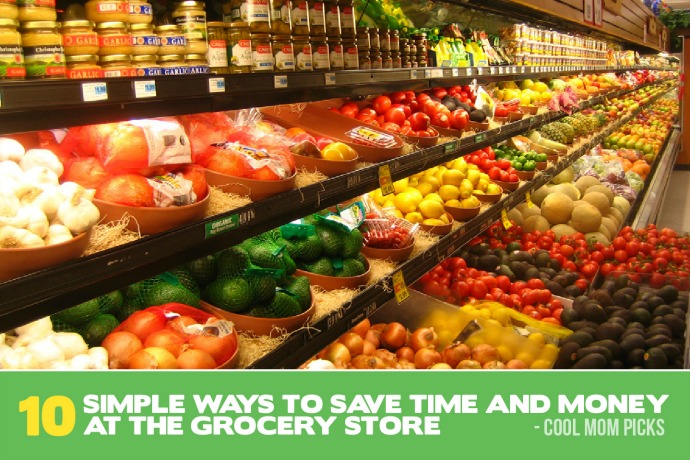We’re always looking for ways to save time and money grocery shopping, especially during the holiday season when we’re all feeling stretched thinner than usual in every way. We’re spending more on holiday gifts and family travel, and even on household groceries for all those relatives coming to visit. Some longer than others. (Just kidding, we love you relatives! All of you.)
Because every minute and every penny counts for us these days, we’re really happy to be working with our newest sponsor hiku, a very cool new gadget and app combo designed to streamline your grocery shopping list and save you tons of time. Let’s just say, no more scrap paper notes and shopping lists hidden around the house. No more getting to the store and forgetting that one super important thing you need.
We’re always psyched to find great new tech that can help us save time and money, but of course there are tons of other shopping tips and tricks that can help you this holiday season and beyond. So we’re happy that hiku asked us to put together our favorites for you.
1. Don’t shop hungry.
Not only should you not shop while your own stomach is growling, but make sure your kids are snacked up too before you hit the grocery store aisles. We’re not sure about you, but we can’t even count the number of (carb-laden) items we’ve bought at the store because we want to eat everything we see. You’ve surely heard it before, but getting everyone a little something in their stomachs before you all go really does help the wallet. Maybe even stash some protein bars or almonds and dried fruit in the glove compartment for pre-shopping snack emergencies.

2. Reusable grocery bags can mean savings.
These days, lots of stores offer discounts to shoppers who bring their own reusable shopping bags. (We’re fans of these funny reusable grocery totes ourselves). Granted, it can be hard to remember them, so our own tried and true method is to make sure you’ve got way more than you think you need at any given time ready to go in your car. Or if you walk or bike to your grocery store, just remember to put your bags right back in the same spot, like in a closet by the door, or near something you absolutely can’t leave the house without — your coat, perhaps?
And hey, even if your store doesn’t offer discounts, you can actually fit waaaaay more items in a cloth bag than in paper or plastic, which can save you trips back and forth from your car to the house.
3. Plan your meals for the week before you shop.
There are two schools of thought about meal planning. Some say that you should create menus based on what you see is on sale in the store, and if that works for you, then awesome. As for us, we’re fans of checking sales online or through circulars when you enter the store, then taking a moment to think through the other necessary items you’ll need to go with those sale items before rolling your cart into the aisles. In other words, tortillas on sale? Great! Now don’t forget the chicken, the salsa, and the sour cream too.
If you’re new to meal planning, we’re fans of apps like gatheredtable or Mom365 to help make it a lot easier.
And to save time, try a free app like Flipp which aggregates all your favorite store circulars for you so you don’t sit and flip through each one. It really does help save tons of time–and money, in the long run.

4. Make a list. And stick to it.
Creating a shopping list has gotten so much easier thanks to tech; no more scribbling notes that accidentally end up in the trash or trying to read someone else’s (terrible) handwriting on the fridge notepad.
Gadgets and apps like hiku are really simplifying list-making for so many shoppers, to help them save a ton of time. Once you download the free app (iOS or Android), simply speak right into the hiku to add to your list, or scan the bar codes of items already in your home. It’s easy to do before you take that empty box of cereal or yogurt tub out to the recycling bin. Get your kids to help–they’ll love it.
Once you’re at the store, it’s super easy to pull up your list on your phone and know everything is right there. Another very cool feature: if someone in your family is at home while you’re out, they can add items right to your list using the hiku. That way you don’t get home and have to say, you forgot to tell me to get more milk! Not like that’s ever happened to us.
5. Differentiate between promotions and sales.
Especially during the holidays, grocery stores can be pretty overwhelming with signs everywhere and promotional stations designed to draw your attention. First, it’s important to remember that just because an item is highlighted on a special shelf with a big ONLY $2.99 price tag on it, doesn’t mean that’s lower than the regular price.
It’s also important to ask yourself whether the items being promoted–on sale or not–are things you might be buying anyway. If you don’t really need that air freshener or frozen mini quiche tray in the first place, it doesn’t matter how cheap it is.
Similarly, while coupons are our friends, be careful to clip only the ones for products you already buy. A great tip is to check the brand websites of products you use and love; they’ll often have printable coupons for customers right on the site that you can print at home, then bring to the store.
6. Shop at off hours.
Timing can really be everything if you have to go to the store because crowds, especially as we get closer to the holidays, can really slow you down. Busy times can also force you to tear through the store more quickly. For us that often means just grabbing an item without first comparing unit prices, or skipping something we really need because we forgot about it two aisles back and don’t feel like pushing through the throngs again. If there’s a chance for you to shop early in the morning or late at night, or on slower days midweek, you can take a little more time and actually get through with more savings. Of course, get to know the rush hours in your own grocery store because they definitely vary by neighborhood.

7. Do your shopping online. Yes, grocery shopping.
So many stores offer grocery pick-up or delivery which is a total godsend to parents. Even though you might pay a little extra for the service or even some of the groceries, there is something to be said for the convenience factor. Especially if time is money in your world. Plus it really does help you focus on purchasing only what you need. And when you look at the list of items in your digital cart, it can even shame you into removing just a few of those convenience foods that seemed good a few minutes earlier.
(Not just us, right?)
8. Shop in bulk…if you’re actually going to use it.
As much as we love shopping bulk (especially our Editor Kristen who’s got four kids), if you’re not going to consume everything before it goes bad, it’s not worth the money. Yes, it’s awesome that 40 bananas are on sale for 6 bucks, but if you’re only going to get through ten of them–and you’re not saving up for banana bread–you are just tossing that money you spent. It’s a mistake everyone makes at some point.
9. Skip the individually wrapped foods.
If you’re really trying to cut back on your budget, skip all the individually packed foods. Yes, cheese with paper between the slices, pre-cut veggies, and washed salad mixes can save you some time, but often those are the items that don’t require much prep at all. Grate your own fresh parmesan, get your cold cuts from the deli counter or butcher, and cut up your own carrots and melon–you’ll save a ton.
Also, be sure to check unit prices! That’s where you really see the difference between a pound of apples, and a pound of pre-cut apple slices. Oof.

10. Be selective about which organic produce to buy.
We do our best to buy the healthiest foods possible for our kids, and that means shopping organic when we can. This Shopper’s Guide to Pesticides in Produce from the Environmental Working Group (EWG) is a really helpful source because it shows you which fruits and veggies have the highest pesticides and which don’t. In other words, skip the organic bananas, but shoot for organic apples. Just know they won’t last as long (with the lack of chemicals and all) so only buy what you know will be eaten pretty quickly.
Also, just because something is marked organic doesn’t necessarily mean the health impact is significant. If it’s a highly processed snack food, you might be better off saving the extra money and applying it towards free-range, organic meats and dairy products.
CMP readers can save even more — get 20% off your own hiku with code coolhikuholiday. Cool!
Thanks to our sponsor hiku for helping make grocery shopping so much easier for parents.



